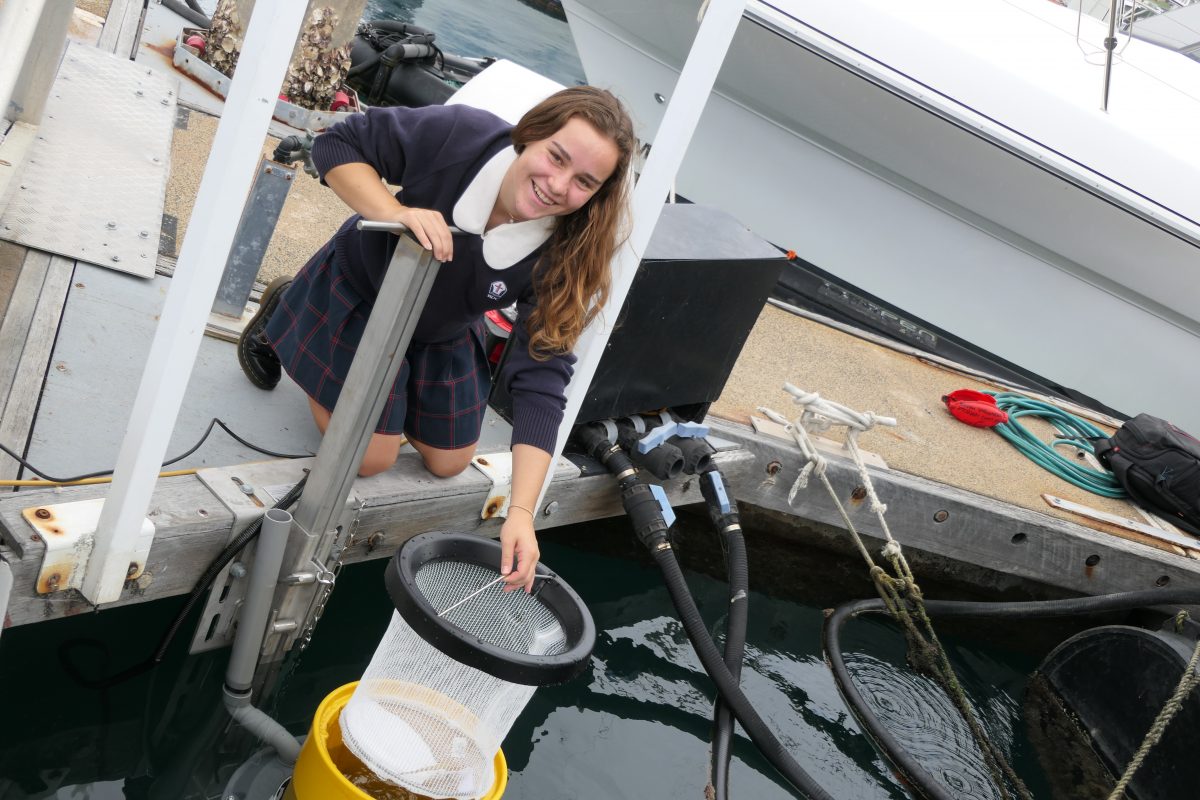Bishop Druitt College help turn the plastic tide
Posted: 03 August 2020

Age range:
Whole school
Curriculum area:
STEM
IDEALS:
- Environmentalism
- Leadership
- Service
Discoveries
- Problem solving
- Sense of responsibility
- Commitment to sustainability
- Teamwork
Overview
Bishop Druitt College has partnered with Prosper Coffs Environmental Trust on the Seabin Project, to install a seabin in Coffs Harbour to help reduce its plastic pollution impact on the protected habitats of the estuary and the wider ocean environment. The Seabin is a cleaning device that will operate 24/7 and will be able to collect up to 1.5kgs of floating debris per day. This includes large plastic bags, bottles, plastic straws, coffee cups, food wrappers, surface oils and micros plastics down to 2mm small.
As part of special pilot program, the rubbish that is collected by the seabin will be analysed and the findings will be recorded and sent through to the national database, where it will be analysed by Seabin Australia. This information will form part of an important educational source for local students on the Coffs Coast who choose to take part in marine studies.
Planning
Prosper Coffs Harbour’s Environmental Trust was instrumental in this project, reaching out to Seabin Australia and creating a crowdfunding page to seek community donations. Students took the lead in advocating for the Seabin and fundraising $5,200 from the community to help fund the project.
We managed to raise enough funds for the Seabin through our entire Bishop Druitt College community. We held a few community events, raffled-off prizes as well as asked for direct donations towards the Seabin through a fundraising webpage. It really was an entire community effort bringing the Seabin to the Coffs Harbour Jetty.
Details
The Seabin (the first of its kind) has now been installed in Coffs Harbour. The Seabin moves up and down with the range of tide collecting all floating rubbish. Water is sucked in from the surface and passes through a catch bag inside the Seabin, with a submersible water pump capable of displacing 25.000 LPH (litres per hour), plugged directly into 110/22V outlet. The water is then pumped back into the marina leaving litter and debris trapped in the catch bag to be disposed of properly.
The Seabin catches an estimated 1.4 tons of floating debris per year (depending on weather and debris volumes) including micro plastics down to 2 mm small, the catch bag has a capacity of 20kg and can be changed multiple times per day.
The Seabin on the Coffs Coast is currently taking part in the pilot program, collecting and analysing the rubbish that is collected. The findings are recorded and sent through to the national database, where it is analysed by Seabin Australia. This information forms part of an important educational source for local BDC students on the Coffs Coast who choose to take part in marine studies.
This programme will also offer a range of STEM based learning opportunities for our students that will offer a direct and significant role in reducing the waste entering our waterways and oceans. From lessons on reducing plastics consumption, recycling, data collection and activities on how to design and build new technologies – the program provides an intensive hand-on program demonstrating the issues concerning waste in our oceans and what we can do about it.
Challenges
At the time we were fundraising we had a series of community events planned where the money we fundraised for would go towards a number of different projects, the Seabin included. What we did not expect was the impact of Coronavirus restrictions and when they were put in place it made it very difficult for us to fundraise.
Impact
Our students really stepped up as leaders within the community to spear-head the campaign to raise funds for this project. It has helped them to develop a real spirit of service and a sense of responsibility. The ongoing project and liaison with Seabin Australia well help our students to develop a deepened commitment to sustainability and help the realise the importance of looking after our oceans.
Long term
Eight million tonnes- that is the amount of plastic rubbish that enters the world’s oceans each year.
Ocean plastics have become a real problem nationally. Huge mats of plastics form on the surface of the oceans, like the Great Pacific Garbage Patch.
Micro-plastics can also find their way into the stomachs of marine mammals, birds, and even in plankton. Macro plastics have been found suspended in the water column at depth by divers. It can be found in our clothes, our food, our skin, our water. It is literally everywhere! The Seabin will operate at the Coffs Marina 24/7 catching floating debris. While this will be effective, it is only a temporary measure. The reason for this is that technology alone is not enough to stopping ocean plastics, education is the real solution.
Coffs Harbour Marina now has the first Seabin on the Coffs Coast, marking an important development in reducing marine litter for the region. Not only is the Seabin a fantastic positive change for our ocean environment but our BDC students benefit from this project many years into the future as a part of their learning programs.
Advice
- Go for it! Partnering with an organisation trying to bring something to Coffs that has positive environmental and educational impacts has been something we are really proud of jumping into.
- Try and incorporate your fundraising into community events, for example we held a whole school Mud Run and raised funds that way.
- Engage the entire community on the journey from the very start so you can travel the journey together and keep updating your community on the happenings.
